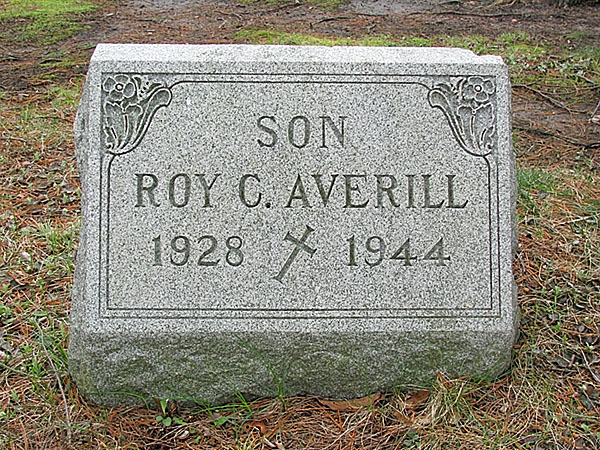The story of the drowning at Olcott Beach Saturday evening reveals not only a heart-rending tragedy, but an example of heroism that even war's noblest exploits cannot surpass.
Sixteen-year-old Roy Averill could be alive today. But he chose instead to expend his last effort and his last breath in what he must have known was the hopeless attempt to save the life of four-and a-half-year-old Robert Gooding.
From the lips of a younger brother, 12-year-old Robert Averill, incoherent at first from the shock of the tragedy, has come the real story of Roy's heroism.
The Averill boys had been walking in Krull Park. They went out on the old Olcott Beach Hotel pier, followed by the Gooding boy. The pier has no railings, and the youngster fell into the water. 12 feet deep at this point.
Roy could swim, but he was not a good swimmer. To reach the Gooding boy, he hung over the pier, his feet touching the water, his hands held by his brother. The Gooding boy grabbed and held onto his feet.
Both older boys yelled themselves hoarse in a vain attempt to attract attention. Their cries were not heard. Their arms pulled almost from their sockets, they held on until they could hold no longer. Robert Averill was forced to let go of brother, forced to let him drop into the dark, icy water. He ran for help when help came it was too late.
Roy Averill could have saved himself. He knew he didn't have a chance to save the Gooding boy unless help came immediately. But he took the chance. He made his choice. His was an heroic decision.
In this decision Roy's background and character stood revealed, a lesson the young American manhood for all to see and an example for all to emulate. The world was before him. He stood at the head of his classes in school. His friends were legion. But he fulfilled a tragic destiny trying to save the life of another.
To Charles Sheehan, who unhesitatingly dove into the cold water to recover the bodies must also go highest praise. Believing that it might still not be too late to revive them, he plunged in where there are no footholds by which he could get out again. In the words of the Olcott fire chief, "Not one man in a hundred would have done it." While the tragic deaths of the Gooding and Averill bous will live long in the minds of Olcott residents, the heroic attempt of Roy Averill and the courageous deed of Mr. Sheehan will shine forth undimmed by the passing of time.
The story of the drowning at Olcott Beach Saturday evening reveals not only a heart-rending tragedy, but an example of heroism that even war's noblest exploits cannot surpass.
Sixteen-year-old Roy Averill could be alive today. But he chose instead to expend his last effort and his last breath in what he must have known was the hopeless attempt to save the life of four-and a-half-year-old Robert Gooding.
From the lips of a younger brother, 12-year-old Robert Averill, incoherent at first from the shock of the tragedy, has come the real story of Roy's heroism.
The Averill boys had been walking in Krull Park. They went out on the old Olcott Beach Hotel pier, followed by the Gooding boy. The pier has no railings, and the youngster fell into the water. 12 feet deep at this point.
Roy could swim, but he was not a good swimmer. To reach the Gooding boy, he hung over the pier, his feet touching the water, his hands held by his brother. The Gooding boy grabbed and held onto his feet.
Both older boys yelled themselves hoarse in a vain attempt to attract attention. Their cries were not heard. Their arms pulled almost from their sockets, they held on until they could hold no longer. Robert Averill was forced to let go of brother, forced to let him drop into the dark, icy water. He ran for help when help came it was too late.
Roy Averill could have saved himself. He knew he didn't have a chance to save the Gooding boy unless help came immediately. But he took the chance. He made his choice. His was an heroic decision.
In this decision Roy's background and character stood revealed, a lesson the young American manhood for all to see and an example for all to emulate. The world was before him. He stood at the head of his classes in school. His friends were legion. But he fulfilled a tragic destiny trying to save the life of another.
To Charles Sheehan, who unhesitatingly dove into the cold water to recover the bodies must also go highest praise. Believing that it might still not be too late to revive them, he plunged in where there are no footholds by which he could get out again. In the words of the Olcott fire chief, "Not one man in a hundred would have done it." While the tragic deaths of the Gooding and Averill bous will live long in the minds of Olcott residents, the heroic attempt of Roy Averill and the courageous deed of Mr. Sheehan will shine forth undimmed by the passing of time.
Family Members
Sponsored by Ancestry
Advertisement
Advertisement




